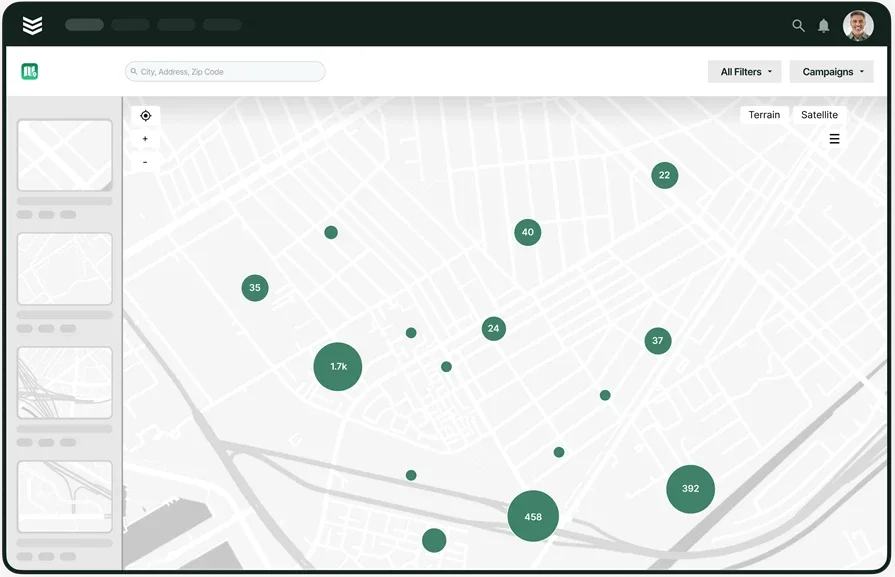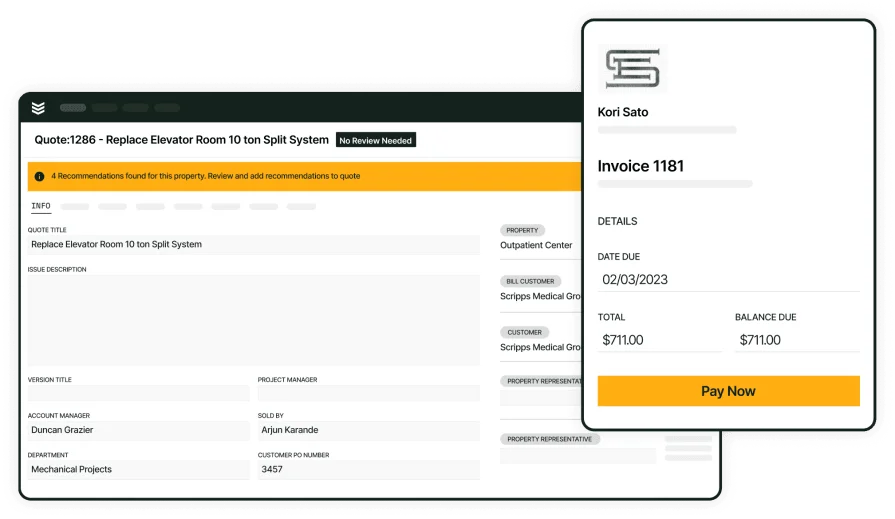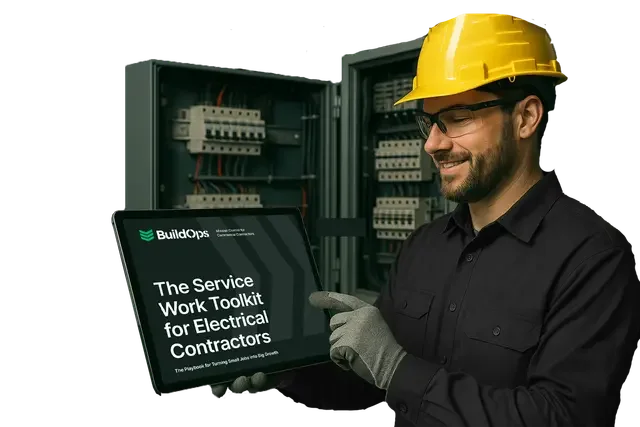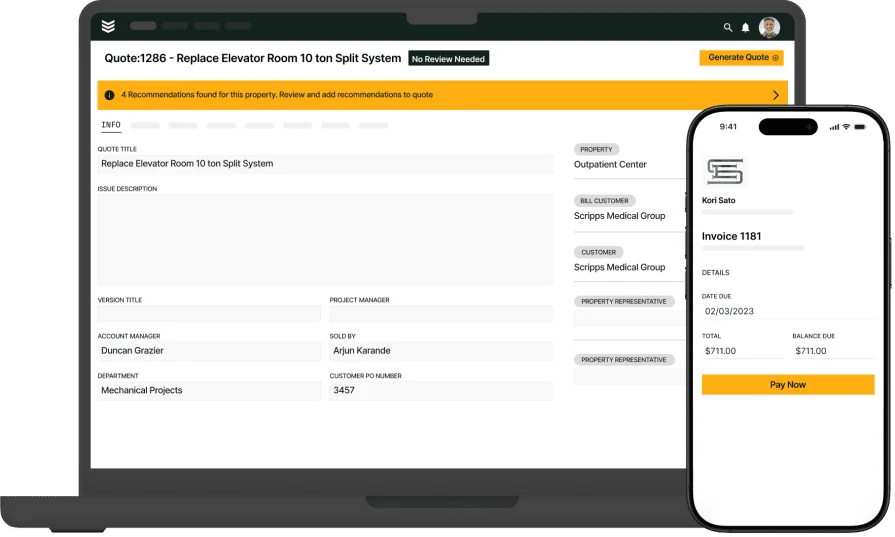When you’re bidding on tight deadlines and juggling multiple projects, the last thing you need is clunky software slowing you down. Electrical contractors need bidding software that helps them move faster, stay accurate, and win more jobs. Having the right tools can mean the difference between landing the job or losing out. This guide breaks down the top options out there, including what features to look for, common mistakes to avoid, and how to choose software that actually works for the way your team runs. If you're in the electrical industry, this one's for you.
- Choosing the right electrical bidding software for your team
- 6 key features to look for in a bidding software for electrical contractors
- 10 best electrical bidding software & solutions for contractors
- 7 benefits of using electrical contractor bidding software
- 5 important electrical bidding software FAQs answered
Getting the most out of bidding software starts with knowing what matters to your team. Speed, accuracy, and job tracking are non-negotiables. The next section lays out what to keep in mind when weighing your options—so you’re not stuck with software that slows you down.
Choosing the right electrical bidding software for your team
Electrical bidding software should match how your team builds estimates, sends quotes, and follows up. If it creates more work or doesn't connect to your current systems, it's going to drag you down. Here’s what to evaluate before committing to anything.
- Workflow fit – Does the software support the way your team builds and sends bids? Can it handle custom pricing structures or multi-phase jobs?
- Integration needs – Does it connect with your estimating, scheduling, and accounting tools? Will it reduce double entry and manual syncing between platforms?
- User access – Can everyone who needs it—estimators, project managers, office staff—get in easily? Does the permission structure make sense for your setup?
- Bid volume and complexity – Can it keep up with the number of bids your team handles each week? Does it scale well for complex takeoffs or multi-site projects?
- Features – Does it include tools like prebuilt templates, takeoff integrations, or change order tracking? Are these features easy to use or buried under a complicated interface?
Once you’ve nailed down what your team actually needs, it’s time to look under the hood. Not all features are worth your time—some just add noise. The next section breaks down the ones that actually move the needle for electrical contractors.
6 key features to look for in a bidding software for electrical contractors
Every bid your team sends out needs to be fast, clear, and competitive—without cutting corners. Electrical contractors can’t afford to waste time switching between systems, chasing job details, or second-guessing material costs. The best electrical bidding software doesn’t just calculate numbers—it pulls everything together so your estimators, techs, and office crew are all on the same page.
1. Integrated CRM and estimating
The strongest bidding software for electrical contractors connects customer relationship management with estimating tools. That means every job lead, past quote, and service detail is tied to the client record. You don’t need to dig through old files or rely on memory—your pricing rules, templates, and notes are all in one place. This keeps your bids accurate and cuts down the time it takes to build them.
Say your estimator is quoting a service upgrade for a long-time property manager. With CRM and estimating tools for electrical contractors, they can instantly pull up past jobs, preferred pricing, and contact info—no emails or calls needed. That context turns a slow back-and-forth into a quick, professional proposal.

Explore our bidding product
We help commercial electricians win bids so they can land more jobs.
2. Proposal scheduling and calendar visibility
Bidding software that syncs with your scheduling system makes it easier to plan labor and understand job timelines before committing. Estimators can see what’s on the calendar, when crews are available, and how job timelines will overlap. This avoids double-booking and helps keep timelines realistic when promising start dates to clients.
Let’s say your team is bidding a panel upgrade at a high-rise while also wrapping up a generator install across town. With proposal scheduling tools for electrical contractors, you’ll know exactly when to schedule the crew, who’s available, and whether a delay on one job will affect another.
3. Technician insight from mobile updates
Bidding software gets even better when it pulls field updates directly from your techs. Mobile apps that let techs add photos, job notes, or material needs feed right back into the estimating process. That way, your office has real context for scope changes and follow-up quotes.
While reviewing an estimate for an EV charger install, your estimator notices a note from the tech: the panel needs an upgrade. With mobile job updates built into electrical bidding software, they can use the photo and note to instantly revise the bid and send a new proposal—without calling the tech or waiting for paperwork.
4. Time tracking and labor forecasting
Knowing how long tasks actually take is key to building accurate bids. Time tracking features inside bidding platforms help estimators spot trends, plan labor better, and quote more precisely. The more you know about your crew’s actual time on similar jobs, the tighter your bids get.
Take a crew that’s been handling multiple tenant fit-outs in an office building. With time tracking software, you’ll notice how long the lighting circuits or panel tie-ins really take. That intel feeds straight into your next proposal—so you’re not underbidding labor or padding unnecessarily.
5. Invoicing and payment workflow integration
The bid isn’t the last step—it's the first move in getting paid. Software that links your bids directly into invoicing and payment systems saves time and reduces errors. It ensures everything from pricing to tax rates to payment terms flow from proposal to invoice without needing to re-enter anything.
Let’s say a property manager accepts your quote for a fire alarm retrofit. With invoicing tools built into electrical bidding software, your office can turn the signed bid into an invoice in minutes—matching the original numbers exactly. That keeps your cash flow clean and your admin team happy.
6. Real-time reporting for bid tracking
Reporting tools inside bidding platforms help track what’s working and where you’re losing out. You can see which types of jobs get accepted most, which take too long to close, and what your average win rate looks like. It gives your team the data to sharpen their approach and improve future bids.
For example, after losing several generator bids, your ops manager pulls up the numbers. With reporting tools tied to electrical bidding software, they see those quotes are taking longer to send and aren’t including scope details that clients keep asking about. A few adjustments later, your acceptance rate starts climbing.
Other notable electrical bidding features to look for
Beyond the core tools, there are smaller features that make a big difference day to day. These additions help tie together your operations—from getting techs to the jobsite to keeping recurring work organized. If your team handles a mix of service and project work, these features can bring extra efficiency without adding complexity.
- Fleet coordination – Tools that help you assign vehicles, track availability, and understand where your crew is heading are essential for planning jobs accurately, and electrical contractors who use fleet management support that visibility.
- Payment processing – Built-in payment tools help you close the loop after the job’s done, making it easier for clients to pay and for you to track revenue. See how electrical contractors can utilize payment tools to support their full job cycle.
- Pipeline visibility – Understanding your upcoming workload helps with resource planning and scheduling future bids. Sales pipeline tools for electrical contractors offer a forecast.
- Recurring work support – If you handle regular inspections, service plans, or maintenance programs, service agreement tools for electrical contractors can help automate the cycle.
- Operational oversight – Reporting beyond bids—such as technician performance or service history—adds another layer of insight to help your team stay ahead. Learn what electrical contractors can uncover from reporting features.
Now that you know what to look for, it’s time to see how the top software stacks up. Whether you’re focused on commercial buildouts or high-volume service work, these tools offer different strengths depending on your workflow and crew size. Let’s break down the best options out there—and where they fit best.
10 best electrical bidding software & solutions for contractors
Choosing the best software comes down to how well it fits your specialization—commercial, residential, or general contracting. Some platforms offer deep customization and integrations, while others focus on simplicity and speed. We’ve broken down top options, highlighting strengths, limitations, and which workflows they support best. If your crew’s dealing with tight timelines and shifting scopes, the tool you pick should help—not hold you back.
1. Best for commercial: BuildOps
BuildOps is built specifically for commercial contractors, with tools tailored to high-volume bidding, complex scopes, and multi-layered job coordination. Estimators can build and send quotes directly from job templates, using saved pricing, labor rates, and customer details pulled from across the platform. The entire process—from takeoff to approval—is fast, flexible, and tied to the rest of your operation.
How pricing works: BuildOps offers custom pricing based on company size and needs. You’ll need to contact their team directly for a demo and quote.
Features beyond bidding: Integrated scheduling, CRM, service agreements, reporting, and mobile tools for field crews—everything connects. It’s not just about winning jobs, but tracking them from proposal to final invoice.
What sets it apart for commercial: BuildOps is designed to handle multi-site jobs, layered scopes, and real-time coordination between field and office. That level of control and visibility makes it ideal for commercial contractors juggling multiple active projects.

Give BuildOps a Try
We help commercial electrical contractors manage jobs from estimate to execution.
2. Best for residential: Housecall Pro
Image Source: Housecall Pro
Housecall Pro is known for its ease of use and clean interface, especially for small-to-mid-size residential contractors. It offers basic quoting tools with a drag-and-drop builder, plus customer communication features to speed up approvals. It’s a solid option if you want a system that’s easy to learn and quick to set up.
How pricing works: Starts at around $49/month for the basic plan, with premium features (like advanced quoting and proposals) available at higher tiers.
Features beyond bidding: Includes online booking, dispatch, calendar sync, review requests, and credit card processing. These features are built for high-frequency residential jobs where speed and automation matter.
What sets it apart for residential: For single-location or family-owned shops focused on residential service, Housecall Pro keeps things simple and fast. But for complex or large-scope projects, it lacks the depth needed to manage change orders, multiple stakeholders, or field-to-office collaboration.
Compare Housecall Pro vs BuildOps features right here.
3. Best for general contractors: Jobber
Image Source: Jobber
Jobber is built with flexibility in mind—ideal for contractors who take on various job types, from service calls to maintenance work across multiple trades. Its quoting features are intuitive, making it easy to send out fast estimates and manage client communications. That makes it a solid choice for general contractors or businesses that don’t need heavy customization.
How pricing works: Plans start around $69/month, with premium tiers offering automation, routing, and more advanced features.
Features beyond bidding: Offers scheduling, client management, invoicing, and real-time updates through the Jobber app. There are also built-in follow-up tools and reminders for customer communication.
What sets it apart for general contracting: Jobber simplifies operations for contractors who handle a little bit of everything. But for electrical contractors who rely on detailed bid breakdowns, custom assemblies, or job costing linked to specific labor rates and parts, Jobber may feel too limited. Its generalist design can lead to workarounds that add friction instead of reducing it.
4. Best for takeoff-heavy estimates: Planswift
Image Source: PlanSwift
Planswift focuses heavily on digital takeoffs, making it a solid option for contractors who work off complex blueprints and need precise quantity counts. It allows users to click and drag across PDF plans to measure wire runs, conduit lengths, and fixture placements. This level of precision helps build material lists quickly and reduces estimating errors.
How pricing works: Annual license fee starting at around $2,000. It includes support, software updates, and 2 hours of training.
Features beyond bidding: Planswift includes customizable assemblies, formula-based calculations, and integration with Excel. It’s designed to speed up material takeoffs, which feeds into faster estimating for bid prep.
What sets it apart for takeoff-heavy estimates: Electrical contractors handling large-scale builds, tenant improvements, or new construction projects benefit from how fast Planswift handles blueprint takeoffs. That said, it lacks broader job management or scheduling tools, and without integrations to dispatch or invoicing systems, it becomes one piece of a multi-tool workflow—adding complexity for teams who prefer an all-in-one platform.
5. Best for pre-loaded pricing databases: Vision InfoSoft
Image Source: Vision Infosoft
Vision InfoSoft stands out with its built-in electrical material pricing database and real-time cost updates. This makes it easier for estimators to stay current with material costs without spending time hunting down prices. It’s designed for contractors who want speed and accuracy in pricing, especially those who frequently quote service upgrades, rewires, or code compliance jobs.
How pricing works: They offer personalized demos to walk you through the software and provide a custom quote based on your business needs.
Features beyond bidding: Includes NEC-compliant assemblies, labor units, and tools for multi-phase job quotes. Also offers basic accounting integration and invoice generation options.
What sets it apart for pre-loaded pricing databases: If your team wants estimates built on accurate, up-to-date material costs without building a custom catalog from scratch, Vision InfoSoft fits well. However, the interface can feel dated, and the lack of deeper integration with field tools or mobile apps limits its usefulness for teams working in the field or coordinating across departments.
6. Best for detailed electrical assemblies: McCormick
Image Source: McCormick
McCormick is built specifically for electrical contractors who need tight control over labor units, assemblies, and code-specific takeoffs. It’s a desktop-based system that’s been refined over decades and remains a go-to for teams handling high-volume estimating with a need for accuracy across large commercial or industrial projects. From conduit layouts to full switchgear setups, McCormick makes it easier to break down complex scopes into detailed components.
How pricing works: McCormick doesn’t list flat-rate pricing. Quotes are provided through direct consultation based on your business size, module needs, and support options.
Features beyond bidding: Includes customizable takeoffs, labor tracking, proposal generation, change order tools, and accounting integrations with platforms like QuickBooks and Sage. It’s designed for estimating-heavy workflows with clear documentation and precise calculations.
What sets it apart for detailed electrical assemblies: If your team builds custom assemblies or works with intricate scope details, McCormick gives you the depth to do it right. But the interface can feel dated, and it lacks modern features like mobile access or real-time field syncing. For teams that need collaboration between estimators, PMs, and field staff, this may require additional tools to fill in the gaps.
7. Best for managing electrical scopes on complex builds: Procore
Image Source: Procore
Procore offers robust tools for electrical contractors working on large, multi-phase jobs—especially those coordinating with multiple trades and general contractors. Its preconstruction tools help manage the bid process, organize scope documents, and streamline communication with vendors and project partners. For firms bidding on high-value electrical packages, Procore keeps everything structured and centralized.
How pricing works: Procore offers custom pricing based on company size, modules, and usage. You'll need to book a demo to get a tailored quote and walkthrough of the platform.
Features beyond bidding: Includes scheduling, spec management, RFIs, submittals, and project financial tracking. These features help electrical teams stay aligned with broader construction timelines and avoid scope creep or miscommunication on deliverables.
What sets it apart for managing electrical scopes on complex builds: Procore helps larger electrical contractors stay organized when managing multiple crews across different job phases. But for teams focused mostly on service or shorter project timelines, the system may be more than what’s needed. Onboarding and setup require time and resources, making it less practical for smaller outfits or lean crews.
8. Best for fast-paced service work: Red Rhino
Image Source: Red Rhino
Red Rhino focuses on helping electrical contractors move quickly, especially in service environments. The platform includes preloaded assemblies and pricing, giving you a head start on common jobs like lighting replacements, panel changes, or tenant improvements. The interface is simple and optimized for speed.
How pricing works: Red Rhino doesn’t post pricing online. Demos are available to walk through functionality and receive a personalized quote.
Features beyond bidding: Includes takeoff tools, proposal templates, customer tracking, and invoice generation. It’s tailored to contractors who prioritize quoting speed and repeatable work.
What sets it apart for fast-paced service work: Red Rhino works well for contractors who turn around lots of small bids every week. But it may feel too limited for complex projects or teams needing integrations with field tools, dispatching, or detailed reporting. It’s efficient—but narrowly focused.
9. Best for enterprise estimating setups: Trimble Accubid Classic
Image Source: Trimble Accubid
Trimble Accubid Classic is designed for enterprise-level electrical contractors with dedicated estimating departments. It supports deep customization, precise takeoffs, and complex job structures—ideal for large firms handling multiple ongoing projects with strict budget controls.
How pricing works: Trimble provides custom quotes through demos. Pricing varies based on the modules and support services selected.
Features beyond bidding: Offers detailed material databases, spec-driven assemblies, phase-based labor, and integrations with major ERP systems. It's highly configurable for businesses that already have structured workflows.
What sets it apart for enterprise estimating setups: Accubid Classic delivers powerful tools for seasoned estimators working on complex scopes. However, it’s not the easiest to learn, and the user interface hasn’t kept pace with newer platforms. Smaller contractors or teams looking for mobile tools may find it too rigid and resource-heavy.
10. Best for budget-conscious contractors: TurboBid
Image Source: TurboBid
TurboBid is geared toward small to mid-sized electrical contractors who need strong estimating features without breaking the bank. It offers preloaded items, customizable assemblies, and basic labor tracking. It’s a practical solution for contractors getting started with digital estimating or upgrading from spreadsheets.
How pricing works: TurboBid offers upfront pricing, with perpetual licenses starting around $1,495. They also offer free demos and paid support packages.
Features beyond bidding: Includes takeoff tools, built-in catalogs, proposal formatting, and some scheduling support. It also provides training resources to help new users get up to speed.
What sets it apart for budget-conscious contractors: TurboBid gives smaller contractors access to features typically found in higher-cost platforms. However, the interface can feel dated, and it may lack the integrations or mobile access needed for teams trying to scale or collaborate across departments.

Improve your service work
Access leading strategies, real-life examples, and pre-built templates.
7 benefits of using electrical contractor bidding software
Electrical contractor bidding software does more than help you build quotes—it reshapes how your electrical business runs from first contact to final invoice. For field service contractors juggling multiple jobs and shifting priorities, the right software means fewer delays, fewer mistakes, and faster approvals. Here’s what you actually gain when your bidding process runs through purpose-built tools.
1. Faster turnaround times
Getting estimates out quickly can be the difference between winning the job or getting left on read. Bidding software helps you build, edit, and send proposals in minutes—not days—using saved templates, labor rates, and materials. That kind of speed keeps your pipeline moving. Learn how electrical invoice and estimate software helps cut delays and keep crews booked.
2. Cleaner job documentation
When bidding tools link directly to work orders, everyone—from techs to office staff—knows what was promised and what needs to be done. There’s no confusion about scope, pricing, or timelines. That kind of clarity reduces callbacks and protects your team when things change mid-job. Here’s how electrical work order and invoice documentation keeps your bids aligned with actual work.
3. Better customer communication
Great bids aren’t just about numbers—they’re about clarity. Modern bidding platforms format proposals professionally and allow for fast, trackable follow-ups. Clients get a quote they can actually understand, and you get faster approvals with fewer back-and-forth emails. If you’re trying to build trust from the first touch, a clean bid helps. See how CRM software for electrical contractors supports smoother customer interactions from quote to close.
4. Reduced errors and rework
Manual bids often lead to costly mistakes—wrong labor rates, outdated material prices, missing scope details. Software built for electrical work helps eliminate those risks by using pre-set pricing and saved assemblies. The fewer errors you make upfront, the fewer change orders you’ll have to issue down the line.
5. Centralized job and pricing data
When your pricing, past jobs, and client records live in one place, your team isn’t wasting time digging through spreadsheets or email threads. Bidding software keeps your critical data connected and searchable—so your estimators, techs, and office staff stay on the same page.
6. Easier job scheduling
Once a bid is approved, you can dispatch crews faster by syncing estimates with your scheduling tools. That means less admin work and fewer handoff delays between sales and operations. When your estimating system talks to your schedule, you move jobs quicker. Check out how electrical dispatch software ties it all together.
7. More consistent invoicing
When a job wraps, your invoice should match the original quote—line for line. Good bidding software helps you carry over labor, materials, and scope directly into the invoice without re-entering a thing. That consistency speeds up billing and makes disputes less likely. Your office gets paid faster, and your client sees you run a tight ship.
Expert Tip
Check out these electrical bid examples to get a feel for how top contractors present scope, pricing, and labor in their proposals. If your current software makes this harder than it should be, it might be time to upgrade.
5 important electrical bidding software FAQs answered
When it comes to quoting electrical work, contractors have a lot of questions about how software fits into the process. Whether you’re trying to reduce delays, improve accuracy, or just ditch manual spreadsheets, understanding how these tools work—and who they’re for—can make all the difference. Here are some of the most common questions answered in plain language.
1. What is electrical bidding software?
Electrical bidding software is a digital tool that helps contractors build and send accurate job proposals by combining labor rates, material costs, and scope details into structured estimates. The software is designed to speed up the quoting process and improve bid accuracy for electrical work.
These tools replace manual spreadsheets with saved assemblies, historical pricing, and templates tailored to how electrical contractors build their quotes. Many also connect to dispatch, invoicing, or project management systems—helping you carry the job forward once the bid is accepted.
2. How does electrical bidding software work?
Electrical bidding software brings together labor rates, material pricing, and job templates into one place. Most platforms let you build quotes using preloaded assemblies or custom inputs, then send those quotes directly to customers for review and approval. Here’s how it typically works:
- You enter job details—scope of work, location, timeline.
- The software pulls in labor and material pricing based on your saved data.
- You adjust quantities, add notes, and apply markups.
- Once the quote is ready, you generate a branded PDF or send it through the platform.
- Some tools also track when the client views it or sends feedback.
Advanced systems connect to your CRM, dispatch board, or invoicing workflow, so approved bids can instantly move into the next stage without re-entering details.
3. Is electrical bidding software worth the cost?
Yes—for most contractors, the time and accuracy gains quickly justify the expense. Manual estimating often leads to errors, delays, and lost jobs. Bidding software helps you move faster, reduce mistakes, and win more work.
The cost of these platforms varies, but when you factor in saved admin hours, fewer missed line items, and faster approvals, the ROI becomes clear. Plus, some solutions offer scalable pricing, so smaller shops don’t have to overpay to get started.
4. Who needs automated electrical bidding software?
Any electrical contractor who builds multiple quotes per week, handles repeat work, or deals with job complexity can benefit from automation. It’s especially valuable for teams that:
- Manage both service and project work
- Need consistent pricing across jobs
- Want to reduce manual entry and speed up turnaround times
- Share quotes between office and field staff
If your current quoting process involves spreadsheets, email threads, or delays in getting estimates out the door, automated bidding software is likely a smart next step.
5. Should I get a stand-alone electrical bidding software, or a field service software with built-in bidding features?
It depends on how your business runs. Stand-alone bidding tools might offer more depth for complex estimating needs—but they often require separate systems for scheduling, dispatch, or invoicing.
On the other hand, field service platforms with built-in bidding features let you manage everything in one place. These work well if you want estimates, job scheduling, technician updates, and invoicing to all talk to each other. For many growing electrical shops, that integration cuts out friction and saves hours every week.
Finding the right electrical bidding software comes down to more than speed—it’s about giving your estimators the tools to build accurate, consistent quotes that win work and keep jobs profitable. Whether you’re handling service calls, tenant fit-outs, or multi-phase upgrades, the features we’ve covered here help reduce errors, improve handoffs, and cut down the time spent chasing paperwork.
The challenge is that most platforms only cover part of the process. You might get solid estimating tools, but no dispatch connection. Or easy quoting, but no visibility once the job’s in progress. BuildOps brings it all together—designed specifically for commercial field service teams that need quoting, scheduling, invoicing, and technician updates in one connected system.

See how it handles real work
We help electrical contractors win more bids to grow business faster.








